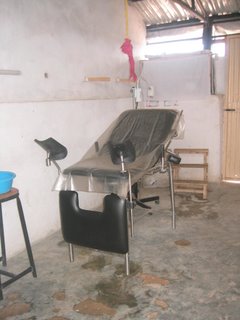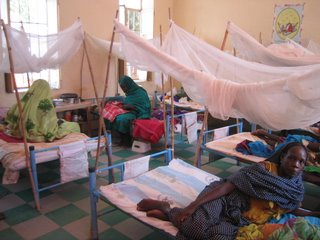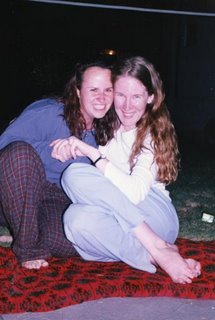
our delivery room


our pediatric ward

an upscale tukul

sunrise over habillah


water delivery
so first things first...forget about that internet access in habilah dream. the organization is flying someone in to repair their lost connection, but it'll take awhile and realistically, by 'awhile' i mean 'probably never'. if any of you have written to my hotmail account since my last email, i can't read it. however, feel free to write to me here as long as you don't send ANY attachments. the next important item is that between typing on a french keyboard (things just aren't where they're supposed to be) and typing on a french keyboard where the letter 'a' takes about 5 tries, there will be much less flow in my ability to write and therefore i will probably get bored sooner and thus expose you to far less lengthy emails :)
so...habillah/habilah/habila (don't ask)...love it. first i'll tell you about the living conditions here in our compound so my mother can be suitably shocked and horrified :)... well i mentioned the outhouses already, and the lack of fans right? some more details: here, milk really does come from cows (i can hear kate replying "it comes from cows here too, sweetheart", but we all know that it really comes from the supermarket). a local woman milks her cow every morning, then comes and sells it to us. we boil it to kill all of the inevitable parasites (don't be disgusted- it's no worse than the pus and antibiotics in the milk you drink at home), we strain it, and we drink it. water? well, water comes from donkeys. every morning a boy arrives with a donkey carrying a huge rubber bag full of water over its back (the same way that everyone who can afford a donkey collects their water here), and empties it into our containers. we take some of it and boil it, then filter it. the rest is used for showering, dishes, etc. some of our floors are cement, and some are sand. everyone except for me sleeps in their own little tukuls (huts) in the courtyard. i turned mine down in favour of a room next to the office with painted walls where i can see anything coming a mile away (and yes, i'm refering to spiders). in spite of the fact that a majority of our "windows" are screened, there is a plethora of insect activity everywhere, which is especially fun at the dinner table. i had a fly actually fly up my nose already. while it was highly unpleasant, i'm sure the experience was far worse for him. the entire population of habilah is either 20, 35 or 70 years old when taking medical histories. the village is swarming with chickens, yet there are almost no eggs (leading andi to conclude that we have successfully solved the age-old debate of which came first). in my first day here i got engaged and had my first baby: apparently you have to be engaged or married in order to be respectful enough to do pelvic exams here. there was a quick moving over of one of my rings, a gratefulness that i had brought a picture of boaz and i with me, and it was just that easy. as for the baby, i had a dream last night that i gave birth to my first child (it was a boy. sorry mom, no granddaughters for you just yet). phil thinks that it was symbolic of my plans to birth this new project.
i arrived yesterday by helicopter and had my first small tour of habilah while flying, while landing, then once on the ground. flying by helicopter was cool because we flew close enough to the ground for me to have an amazing view of the landscape. there's truly not much to see, yet it's so easy to see why africa can get so under your skin. the village is surreal, with an earthly beauty in spite of it's history and it's poverty. the landscape and all structures upon it are shades of brown and red, caked with the dust that permeates the entire atmosphere. the people, however, dress in brilliant, vibrant colours that show an incredible contrast with the setting. men in white hats and long, white robes sit on the sides of the road in the shade, mostly telling the children who are following us to leave us alone. the women walk down the 'roads' carrying huge bundles of wood or pots on their heads, and with babies strapped to their backs. the children are dirty and run around barefoot sporting torn, filthy clothes. these children don't fit the criteria for being malnourished, but they certainly aren't anywhere close to being considered well-nourished (this will change soon as the WFP has cut the food rations in half due to a lack of funding. there has already been a big increase in the number of children being admitted to the therapeutic feeding centre at the hospital). each dwelling is set apart by a "fence" of sorts, some of them made with woven straw, some with brick, others with dried, spiky brush. each fence encloses a perfect square, and within that square compound lie the tukuls of the people. some are fairly well built, while others look thrown together with whatever material happens to have blown by. the village of habilah, once home to around 5,000 people, has swelled to around 25,000 with the influx of the IDP's (internally displaced people). however, rather than living separately from the villagers, the idps here are integrated into the village, making it hard to know who is displaced and who isn't. the people have started to try to make a life for themselves here. as aurelie put it "they've taken an abnormal situation and made it normal". another difference here is that the nomads and the villagers get along, leaving habilah with a peace that has alluded other villages/idp camps.
our little hospital is adorable as are those that staff it. i got to meet our staff, and see the different sections of the hospital, getting a small idea as to what it is that we're doing here in habilah. there are examination rooms for the out-patients who come in daily for the more minor illnesses and injuries. the inpatient ward is where the patients who have to be admitted stay (side note: one of the patients in the ward is a beautiful 10 year old boy named Adam whose hand was blown off when he picked up and played with a random grenade (the third victim from his village in the last little while). he lay in his bed with one stump and his three remaining limbs wrapped in white gauze and he still managed to give us a blinding smile). when we got to the women's centre, the women i'm going to be working with in the centre came out dancing and singing, while one of them emitted what sounded like a high pitched war-cry. one of them came running to hug me and they started to show me the small, handwritten signs on their clothes that read "well come mrs Amy". there's a little room with 2 beds for the women in labour, and a small adjoining room for the deliveries. i almost died when i saw the new "delivery table" complete with stirrups. yeah, no. on the plus side, everyone here breastfeeds and it seems that nestle hasn't managed to get a foothold in sudan just yet. their milk powder and babyfood is sold in the market though, so i'm sure it's just a matter of time before infant formula starts contributing to the infant mortality rate here as well. behind the two rooms is a private courtyard where the labouring women can walk around, rinse off or use a private latrine. we went to the TFC next, which is the therapeutic feeding centre. one large tent contained 10 small, malnourished children, each with a mother or older sister to care for them. they stay all day so the families can be taught how to care for them (and so the mother doesn't divide the food between her other hungry children) and at 5pm they go home with a bag of food for the night. once the child reaches a level of 'moderate' malnutrition, they graduate to the SFC (supplementary feeding centre), where the family comes to pick up 2 weeks worth of food at a time. next we saw the small room that has been converted to an operating theatre. surgical cases are refered to el geneina unless it's night and travel is forbidden, or it's a life or death emergency. the last surgery was a c-section on a woman who had an obstructed labour for 2 days. when she went into shock the team set up an impromptu operating table and performed the surgery. my first real conversation with andi the logistician was him telling me about standing over the table, trying to hang a light so they could see what they were doing, and looking down and making eye-contact with the patient, and how it felt when they delivered her of a dead baby, then lost her as well 3 hours later. not something that a former businessman deals with in austria very often.
my team here consists, thus far, of myself, carmenza, milena and andi. carmenza is a doctor from colombia, milena is a nurse from switzerland, and andi is the former businessman from austria. the others i've mentioned are just here for a visit from headquarters. bruno is the guy in geneva overseeing the msf projects in sudan (and other countries as well), phil is the head of mission in sudan and, leaving the absolute best for last, aurelie (french, but living in geneva) who deals with communications. i LOVE that girl. she is the epitome of all that is cool about europeans, while managing to not possess a single of the stereotypical negative qualities. i've loved having her here for my first week, and i'm trying to convince her of her need to move herself, her husband and their baby to sudan simply to hang out with me.
alright, i'm bored of writing. there are some stories i want to tell about a couple of my encounters thus far but i've long reached the end of your attention-spans, as well as my own. maybe another day.
ps i may not post all emails on the blog, because it was pointed out that i can't control who reads it and things that i say can be linked back to msf. the emails that contain the more sensitive things won't be posted, if and when i feel like writing emails that contain sensitive things.
smooches,
Ames














